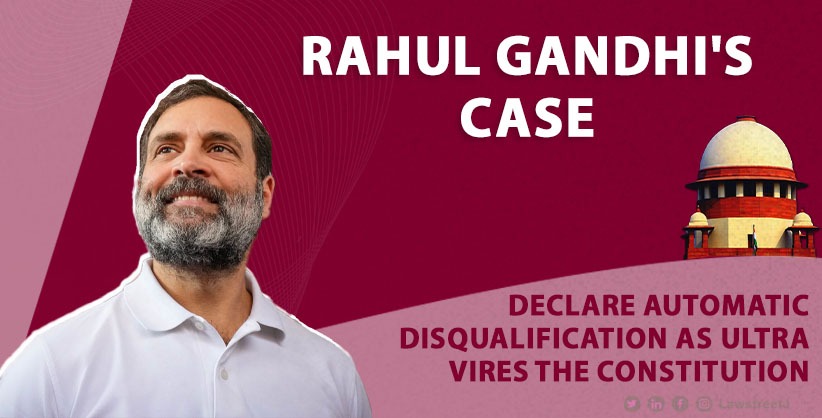NEW DELHI: With the disqualification of Rahul Gandhi as an MP, a social worker from Kerala has approached the Supreme Court, challenging validity of provisions of the Representation of People Act, mandating "blanket and automatic" disqualification of legislators upon conviction and sentence, without considering the nature, gravity, and seriousness of the offences.
Aabha Muralidharan, from Malappuram sought a direction that there did not exist any automatic disqualification under Section 8 (3) of the Representation of People Act, 1951.
The plea filed through advocate Deepak Prakash referred to disqualification of Congress leader Rahul Gandhi as the MP from Wayanad on Friday by the Lok Sabha secretariat. The action came a day after his his conviction and sentence of two years by a Surat court for his remarks as to 'why all thieves had Modi surname' in a rally in 2019 in Kolar.
"The said conviction of Rahul Gandhi has been challenged, however, in light of the operations of the present disqualification rules, as per the 1951 Act, the stage of appeal, the nature of offences, the gravity of the offences and the impact of the same over the society and nation are not being considered, and in a blanket manner, an automatic disqualification is ordered," it said.
The plea contended that automatic disqualification under Section 8 (3) should be declared as ultra vires of the Constitution, for being arbitrary, illegal and violative of fundamental right to equality.
It asked the court to issue orders that the mandate of Section 499 (defamation) of IPC or any other offence prescribing maximum punishment of two years will not automatically disqualify any sitting member of any legislative body for it violated the freedom of speech and expression of an elected representative.
The factors such as nature, gravity, role, moral turpitude and the role of the accused, ought to be examined while considering disqualification under Chapter III of the 1951 Act, it said.
"The grounds for disqualification ought to be specific with the nature of offences as specified under the Code for Criminal Procedure and not in a blanket form, as is currently in force under Section 8(3) of the RP Act," it said.
The writ petition further contended the interpretation provided by the Supreme Court in Lily Thomas case (2013) required re-examination, to the effect of adjudicating the provisions of disqualification under Chapter III of the 1951 Act, vis a vis, the classification of offences in the schedule and the gravity of offences, which can be petty, serious or heinous in nature.
"The operations of Lily Thomas case are being blatantly misused for wreaking personal vengeance against the political parties," it claimed.
The petitioner sought a direction that criminal defamation must be excepted from the sweep of the judgement in Lily Thomas case, otherwise it would have a chilling effect on the right of representation of the citizens.
"The right under Article 19 (1) (a) (freedom of speech and expression) enjoyed by the Member of the Parliament is an extension of the voice of millions of his supporters. If the offence under Section 499 and 500 of the IPC, which just technically has a maximum punishment of two years is not removed singularly from the sweeping effect of the judgement in Lily Thomas, it will have a chilling effect on the right of representation of the citizens," it said.









